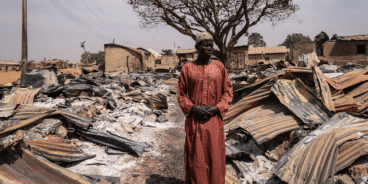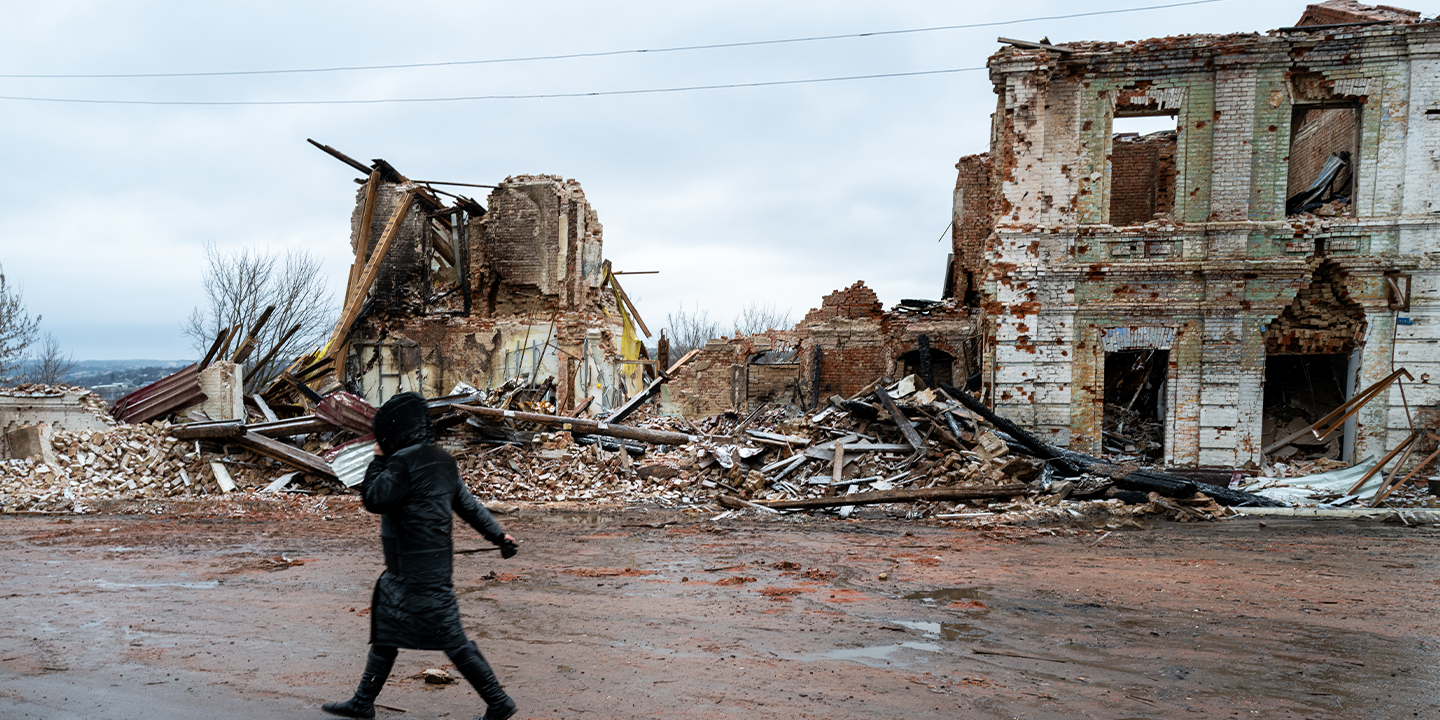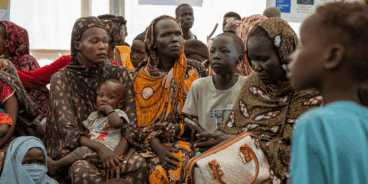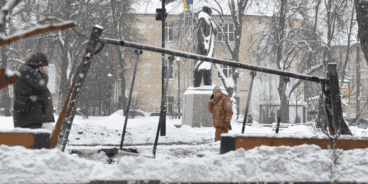

Atrocity Alert No. 330: Ukraine, Burkina Faso and South Sudan
Atrocity Alert is a weekly publication by the Global Centre for the Responsibility to Protect highlighting situations where populations are at risk of, or are enduring, mass atrocity crimes.
CIVILIAN SUFFERING IN UKRAINE MOUNTS AMIDST HEAVY FIGHTING AND DAILY AIR STRIKES
Since late December, Ukraine’s eastern regions of Donetsk and Luhansk have witnessed some of the most intense fighting since the Russian invasion of Ukraine in February 2022, triggering escalating casualties and damage to civilian infrastructure on both sides of the front line. According to Farhan Haq, the Deputy Spokesperson for the UN Secretary-General, Ukrainian authorities reported more than 50 civilian casualties on 31 December alone, including children and journalists. Daily air and rocket strikes have left the towns of Bakhmut and Soledar in Donetsk almost completely destroyed and without electricity or running water for months. Although Russian President Vladimir Putin declared a unilateral ceasefire over the Orthodox Christmas period from 6-7 January, the move was rebuked by the Ukrainian government as an attempt to halt Ukrainian advances.
Fighting also continues in the southern Kherson region, where a family of three, including a 12-year-old boy, was killed when their home was struck by shelling in Beryslav on 5 January. According to the region’s governor, the hospital in Kherson city was shelled on New Year’s Day and at least two other health facilities were damaged in the preceding days. Human Rights Watch recently reported on the pillaging of thousands of valuable artifacts and artworks from museums, a cathedral and a national archive in the Kherson region as Russian forces withdrew. Targeted attacks on civilians and civilian infrastructure – such as health facilities – and the looting of cultural heritage are prohibited under International Humanitarian Law and may amount to war crimes.
According to the UN Human Rights Monitoring Mission in Ukraine, 6,884 people, including 429 children, have been killed since Russia invaded Ukraine on 24 February. The UN has acknowledged that the actual death toll is much higher. Meanwhile, more than 18 million people – 40 percent of Ukraine’s population – remain in need of humanitarian aid while 7.83 million have fled the country and 6.5 million more remain internally displaced. Millions are also without electricity and heat in the cold winter months, as Russian forces continue to target Ukraine’s power infrastructure.
While Ukraine hopes to hold a peace conference in the coming months, progress regarding conflict resolution and advancing justice remains elusive. The Executive Director of the Global Centre for the Responsibility to Protect, Savita Pawnday, said, “While the international community continues to militarily support Ukraine, victims and survivors need long-standing solutions in the form of peace and accountability for atrocities and continued support in rebuilding their lives and livelihoods.”
DOZENS OF FULANI CIVILIANS KILLED DURING TARGETED ATTACK IN BURKINA FASO
Dozens of ethnic Fulani people, including children, were killed between 30-31 December in the town of Nouna, a predominately ethnic Fulani and Muslim community in northwestern Burkina Faso. Survivors interviewed by Amnesty International said at least 86 corpses were retrieved and buried on 31 December. In subsequent days, other corpses were found riddled with bullets. Local human rights organizations allege that the government-sponsored Volunteers for the Defense of the Homeland (VDP) – the volunteer militia established in 2020 to support the army’s fight against armed Islamist groups – carried out the killings in retaliation for an attack by suspected members of an Al-Qaeda affiliated armed Islamist group in the early morning of 30 December. Witnesses allege that the VDP members were traditional hunters called “Dozos,” who come mainly from the ethnic Dogon community.
In a statement on 4 January, the Burkinabé Movement for Human and Peoples’ Rights stressed that the killings and “other summary and extrajudicial executions have contributed to plunging our country into an infernal cycle of violence. Over the years, this violence has taken on an ethnic character and has further weakened the social fabric…” Since the targeted killings in Nouna, there has been a proliferation of hate speech and incitement to discrimination and hostility, according to the government.
Inter-communal violence and attacks by armed Islamist groups have intensified across Burkina Faso in the past year. Members of the army and VDP have previously been implicated in grave crimes, including unlawful killings, torture and enforced disappearances. Fulani people have been regularly targeted by the army and communal defense militias due to alleged support for armed Islamist groups. According to the Collective Against Impunity and Stigmatization of Communities, a Burkinabé civil society group, violence against the Fulani community has escalated since the coup in September 2022, with nearly 250 extrajudicial killings between October and January compared to 95 in the previous four months.
In an effort to curtail the spread of violence, in November Burkinabé authorities launched a drive to recruit 50,000 people into the VDP to fight alongside the army. The Office of the UN High Commissioner for Human Rights warned of the need to strengthen vetting procedures, training on international human rights and humanitarian law and effective supervision by the defense and security forces.
Burkinabé authorities should implement programs to mediate inter-communal tensions and combat the proliferation of hate speech. While combating armed Islamist groups, it is essential that the army and VDP ensure that efforts to counter violent extremism do not further exacerbate inter-communal tensions and are undertaken in strict compliance with international law. The government must hold all those responsible for the targeted killings in Nouna to account regardless of position or rank.
ONSET OF DRY SEASON IN SOUTH SUDAN MARKED BY INCREASED FIGHTING
On 24 December armed Nuer youths from South Sudan’s Jonglei State attacked communities in the Greater Pibor Administrative Area, setting homes ablaze, raiding cattle and destroying civilian property. Ensuing fighting between youth groups from the Nuer and Murle communities resulted in at least 57 people killed and 30,000 displaced in the Greater Upper Nile region. On 29 December the UN Humanitarian Coordinator for South Sudan, Sara Beysolow Nyanti, denounced the violence, stating that, “People have suffered enough. Civilians, especially those most vulnerable – women, children, the elderly and the disabled – bear the brunt of this prolonged crisis.”
The violence is demonstrative of the deteriorating security situation in South Sudan in recent months. The onset of the dry season has been characterized by increased violence and atrocities, including clashes between armed groups in northern Jonglei and Upper Nile states, inter-communal violence in northern Warrap, and ongoing cattle-raiding and migration-related conflicts in the Equatorias.
Prior to the escalation of fighting, the UN Special Representative of the Secretary-General and Head of the UN Mission in South Sudan, Nicolas Haysom, warned on 13 December that “the security situation in Upper Nile State continues to be a particular concern and has the potential to further deteriorate.” During a briefing to the UN Security Council, Haysom highlighted that the Upper Nile State remains marked by ethnic violence, grave human rights violations and abuses, including killing and conflict-related sexual violence. According to the UN High Commissioner for Human Rights, at least 166 civilians were killed in clashes in Upper Nile State between August and 14 December.
Political instability and armed conflict have been pervasive in South Sudan for most of its 11.5 years of independence. Delays in implementing the 2018 peace agreement and ongoing political rivalries have exacerbated tensions within South Sudan’s ethnically diverse population. While progress has been made in the political process, such as the recent passing of the Constitution Making Process Act and the ratification of the Roadmap by the Transitional National Legislature, key challenges remain, including the adoption and implementation of legal and technical arrangements for national elections, as well as justice and accountability measures to address past atrocities.
All armed groups must immediately cease hostilities and respect International Humanitarian Law to prevent further civilian harm. The Transitional Government of South Sudan must make every effort to stop the fighting, address the root causes of violence between communities and ensure the safety and security of all populations.
Related Content


Atrocity Alert No. 467: South Sudan, Israel and the Occupied Palestinian Territory and Venezuela
